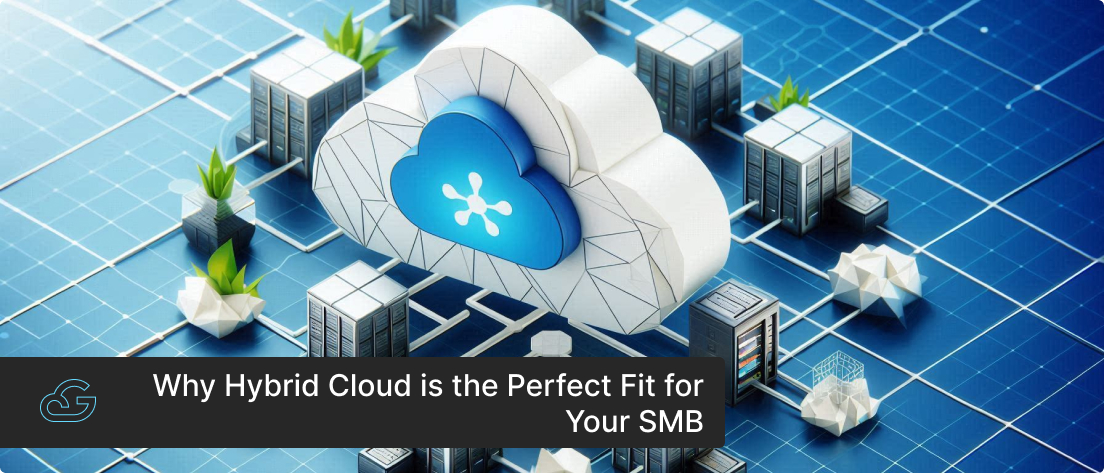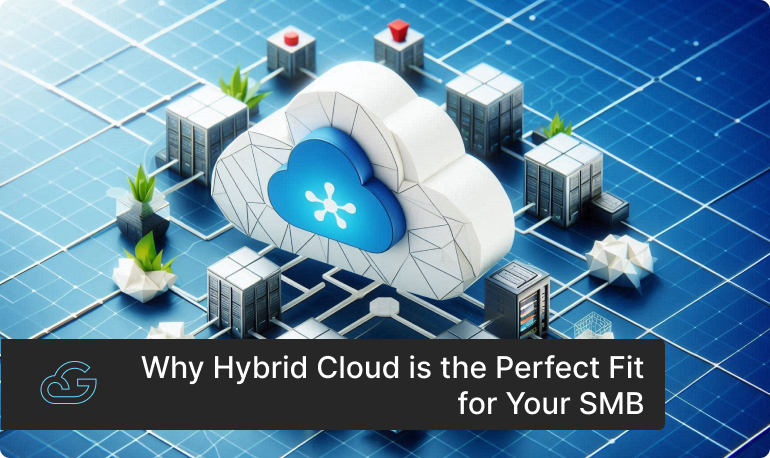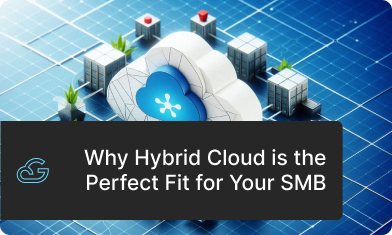Blogs / Hybrid Cloud
Why Hybrid Cloud is the Perfect Fit for Small and Medium Businesses (SMBs)
By
Harish KK
Posted: March 12, 2024
• 7 Minutes 29 Seconds
For small and medium-sized businesses (SMBs), their world resembles a “David and Goliath” story. These nimble Davids must compete against big players, or the Goliaths of their respective industries, who come with deep pockets and resources and have access to almost all the latest technological innovations.
For instance, an SMB operating in the E-commerce space will naturally have to go up against market giants like Amazon, Walmart, etc., at some point in time. And if they aren’t ready to compete, they will never be able to break into the monopolized market and evolve as a company. So how can they achieve this? The answer to this question lies in a cloud concept called “Hybrid Cloud”.
If an unbreakable spirit and a slingshot were David’s allies in his battle, here the hybrid cloud is a perfect ally for SMBs. In this blog post, we will zoom in on the concept of hybrid cloud while highlighting how SMBs can leverage it to attain success.
So, let’s start by explaining the concept of hybrid cloud.
What is Hybrid Cloud?
A hybrid cloud is a computing environment that combines a public cloud and a private cloud (usually hosted within an on-prem data center). This unique cloud architectural model leverages the strengths of both deployment approaches. It allows organizations to utilize public cloud resources for short-term projects or workloads, which can be more cost-effective than using their own on-prem data center infrastructure.
At the same time, they can leverage a private cloud environment for projects or applications that demand a higher level of data security and protection. This flexibility helps organizations avoid overspending on IT equipment meant for short-term usage only.
As per the latest insights, about 72% of companies have already adopted a hybrid cloud strategy. This emphasizes the pivotal role it plays in powering modern-day applications, processes, and systems. One of the key aspects that sets apart a hybrid cloud model is the interoperability and portability of the workload.
That is, by configuring a hybrid cloud model, organizations can manage and migrate workloads across different cloud environments based on their specific business requirements. This is particularly helpful for SMBs in modernizing their IT infrastructure, solving their resource constraints, achieving cost-efficiency without compromising on performance, etc.
But before we delve into the key add-ons a hybrid cloud strategy brings to a SMB, it is important to understand what their challenges and pain points are. Let’s go over them in detail in the next section.
Major Challenges for Small and Medium Sized Businesses
-
Operating Budget:
SMBs usually have limited financial resources available to them. And because of that, they find it difficult to invest in new and expensive IT infrastructure, software licenses, etc.
-
Scalability & Performance:
During their growth phase, SMBs often struggle with their on-prem infrastructures. These hardware, software, and networking elements often struggle to keep up with increasing workloads, changing user demands, and enhanced data storage needs, leading to performance bottlenecks and poor end-user experience.
-
Data Security & Regulatory Compliance:
Ensuring data security and regulatory compliance is vital for all organizations. However, SMBs often find it challenging to implement robust security mechanisms and governance frameworks and acquire the necessary expertise. Consequently, they may struggle to protect sensitive customer information, leading to non-compliance penalties.
-
Technical Expertise:
When compared with other big enterprises, SMBs operate with smaller IT teams with limited specialized skillsets. This creates a scenario where they are unable to leverage emerging technologies, cloud solutions, and much more, hampering their ability to innovate and compete.
-
Data Backup & Disaster Recovery:
Data loss can lead to major ramifications like financial loss, operational disruptions, and breach of compliance regulations. But, since SMBs operate with a smaller budget, it is extremely difficult for them to implement reliable backup and disaster recovery solutions.
-
Infrastructure Modernization:
Many SMBs struggle with the burden of legacy systems and applications. These outdated systems and applications, which are incompatible with modern technologies, make it difficult for SMBs to achieve a competitive edge.
These are some of the major obstacles SMBs face on a day-to-day basis. But with a well-defined hybrid cloud strategy, they can overcome these challenges easily and position themselves to achieve sustainable growth and success. Let’s analyze why hybrid cloud is beneficial for SMBs.
Why is Hybrid Cloud the Ideal Solution for Small & Medium-Sized Businesses?
-
Enables Cost Optimization & Scalability:
For SMBs, a hybrid cloud strategy offers seamless scalability and cost optimization. As it uses a combination of public and private clouds for running workloads, SMBs can dynamically scale resources based on changing business needs and workload demands without incurring any upfront costs.
Consider the hypothetical scenario of an SMB preparing for the Black Friday Cyber Monday (BFCM) shopping event. Due to the huge spike in website traffic during BFCM, this SMB must ensure that its infrastructure can handle the increased workload efficiently. Traditionally, an SMB relying solely on on-prem data center infrastructure would require significant investments in additional computing power, storage resources, and networking capabilities in scenarios like these.
But on the other hand, for SMBs leveraging a hybrid cloud strategy, things are vastly different. They can leverage the “pay-as-you-go” pricing model of public cloud services to provision additional computing power and networking capabilities on-demand, precisely when the need arises.
-
Enhances Security & Compliance:
Data privacy, security, and regulatory compliance are key tenets for modern-day organizations. However, SMBs that function solely with on-prem infrastructure quite often struggle to implement the most advanced data security measures and data privacy mechanisms, leading to penalties and legal battles.
But, with a hybrid cloud strategy, SMBs can easily distribute their workloads across environments based on security and compliance requirements. They can use the public cloud for less sensitive, high-volume tasks like web hosting or other customer-facing applications. At the same time, they can maintain control over mission-critical, highly regulated tasks like financial data processing or maintaining healthcare records within their private clouds.
This distribution of workloads allows SMBs to capitalize on the robust security capabilities of the public cloud, such as encryption, data masking, access controls, and continuous monitoring, for certain use cases. At the same time, it ensures maximum protection and adherence to regulatory requirements for their most sensitive operations by keeping them in controlled private cloud environments. This can help SMBs to bolster their security posture and avoid costly data breaches or non-compliance penalties.
-
Access to Cloud Service Providers & Technical Expertise:
SMBs often lack the technical knowledge and resources required to deploy and manage complex tasks. From implementing DevOps practices to leveraging advanced analytics, there are various areas where SMBs require specialized expertise.
A hybrid cloud strategy allows these SMBs to partner with cloud service providers and managed cloud service providers, who come with a wealth of technical expertise, industry best practices, etc. By collaborating with these partners, SMBs can gain access to a vast pool of knowledge and other emerging technologies.
Apart from establishing an effective hybrid cloud architecture, this collaborative approach enables SMBs to focus on their core For example, a manufacturing SMB looking to integrate AI/ML-powered predictive maintenance into its workflows could leverage its cloud partner’s data science expertise. This allows the company to rapidly experiment with advanced analytics on a hybrid cloud infrastructure without building these capabilities from scratch.
-
Ensures Business Continuity & Resilience:
Ensuring business continuity and resilience is extremely critical for SMBs. Any unexpected disruptions or downtimes can drastically impact their bottom line and customer experience and even lead to loss of critical data. With a hybrid cloud architecture, SMBs can ensure complete protection of their customer data and keep their operations running consistently.
By harnessing the redundancy and geographical distribution of cloud resources, SMBs can enable efficient disaster recovery and business continuity. That is, in the event of a localized outage or a natural disaster affecting their on-prem data center, SMBs can facilitate quick failover to alternative cloud environments. This minimizes downtime and ensures uninterrupted operations.
-
Fosters Collaboration & Productivity:
Fostering seamless collaboration and driving productivity across different teams is vital for SMBs. They can use cloud-based collaboration tools (Slack, Dropbox, Google Drive, etc.) and productivity suites (Microsoft 365, Google Workspace, etc.), which are integrated through a hybrid cloud model, to achieve this objective, regardless of geographic boundaries or resource constraints.
Take, for instance, an SMB with a distributed workforce across multiple locations can use the hybrid cloud model to host their collaboration and productivity tools in the cloud. The company can then securely integrate these tools with their on-prem systems and data repositories. This ensures seamless access to essential resources, empowering employees to work collaboratively and driving productivity, irrespective of their physical location.
-
Facilitates Infrastructure Modernization:
Legacy systems are one of the major problems associated with SMBs. They invest in these systems early in their organizational lifecycle and are typically stuck with them forever. This hinders their ability to adopt modern technologies, creating operational inefficiencies, impeding innovation, and much more.
A hybrid cloud strategy can help SMBs mitigate this challenge by facilitating gradual IT infrastructure modernization. That is, they don’t have to replace the total legacy infrastructure setup in one go. Instead, they can integrate these legacy systems with cloud-based services and applications, incrementally migrating workloads, minimizing disruptions, and facilitating seamless data exchange between old and new environments.
Why Gsoft Hybrid Cloud Solutions?
Gsoft Cloud specializes in helping businesses of all sizes set up hybrid cloud environments. Our team of experts comes with extensive knowledge of all major cloud service providers, helping us identify the right cloud platform for our clients. Our hybrid cloud solutions enable clients to unlock innovation, optimize costs, and enhance productivity.
By partnering with us, you will be able to:
- Maximize ROI with your existing IT infrastructure.
- Obtain greater flexibility.
- Innovate faster.
- Improve data security.
Summary:
Hybrid cloud is the go-to cloud strategy for modern-day organizations. It offers the best of both worlds—public and private cloud—while helping enterprises maximize their ROI from their existing IT infrastructure. This is particularly beneficial for SMBs, who function with limited technical expertise and capital. By offering numerous benefits such as cost optimization, seamless scalability, enhanced data protection, and much more, hybrid cloud is providing a level playing field for SMBs to compete with the big players.
Are you a small or medium-sized business owner looking to integrate a hybrid cloud strategy? Reach out to us today at www.gsoftcomm.net/contact-us and let us help you tap into the full potential of hybrid cloud.


Get Know More About Our Services and Products
Reach to us if you have any queries on any of our products or Services.











